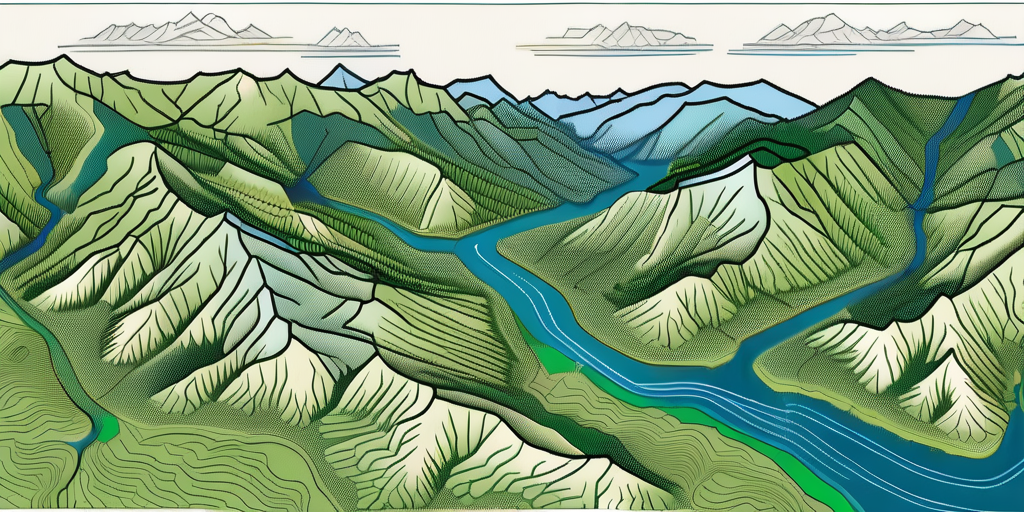
East Tennessee is not just a beautiful region; it is also a gateway to some of the most stunning national parks in the United States. This unique geographic location, coupled with a rich history and vibrant communities, makes East Tennessee a special place for outdoor enthusiasts and nature lovers alike. In this article, we will explore the geography of East Tennessee, the role of national parks, their economic impact, and what the future holds for these treasured landscapes.
East Tennessee is defined by its diverse landscapes and breathtaking natural beauty. The Appalachian Mountains dominate the region, providing a dramatic backdrop that enhances the outdoor experience. The rolling hills, lush valleys, and cascading rivers create a mosaic of ecosystems that support a variety of wildlife. Each season paints this landscape in a different hue, making it an ever-changing canvas of beauty.

From the Great Smoky Mountains National Park, which boasts some of the oldest mountains in North America, to the serene lakes that dot the landscape, the geography of East Tennessee not only attracts visitors but also fosters a deep sense of pride among locals. Hiking trails, scenic overlooks, and natural wonders abound, inviting all to explore. The region's rich biodiversity includes species such as black bears, elk, and a myriad of bird species, making it a haven for wildlife enthusiasts and photographers alike. Furthermore, the vibrant wildflower blooms in spring and the fiery foliage in autumn create a stunning visual feast that draws nature lovers from far and wide.
One of the standout features of East Tennessee is its proximity to several national parks, most notably the Great Smoky Mountains National Park. Just a short drive from many East Tennessee towns, the park offers over 800 miles of hiking trails and a rich array of flora and fauna, making it a major draw for both local and out-of-state visitors.
Additionally, the Cherokee National Forest and the Cumberland Gap National Historical Park are within easy reach, allowing residents and visitors alike to experience the magical combination of adventure and tranquility that these parks offer. This easy access enhances the quality of life in East Tennessee by providing more opportunities for outdoor recreation all year round. The Cherokee National Forest, with its extensive network of trails, is particularly popular for mountain biking and horseback riding, while the Cumberland Gap National Historical Park offers a glimpse into the region's history as a key passageway for early settlers. The rich cultural heritage found in these areas, including Native American history and pioneer stories, adds another layer of depth to the outdoor experience, making every hike or picnic an opportunity to connect with the past as well as the present.
The establishment of national parks in Tennessee has a storied history that dates back to the early 20th century. The Great Smoky Mountains National Park, designated in 1934, was created to preserve the unique ecosystem and rich cultural history of the region. It stands as a testament to the importance of conservation and the value of natural spaces in American culture.

Over the decades, these parks have provided a refuge for wildlife, a home for native plants, and a place for people to connect. They have played a critical role in shaping Tennessee's identity by highlighting the state’s commitment to preserving its natural heritage for future generations. The park is not only a haven for biodiversity, with over 19,000 documented species, but it also serves as a living museum of Southern Appalachian culture, showcasing the traditions and lifestyles of early settlers through preserved structures and interpretive programs.
National parks are vital to the community fabric of East Tennessee. They draw millions of visitors annually, contributing significantly to local economies through tourism. Restaurants, shops, and hotels thrive by catering to the needs of park-goers looking to experience the wonders of the great outdoors.
Moreover, community initiatives often arise around national parks, promoting conservation efforts, educational programs, and cultural events that engage residents and visitors alike. This interaction fosters a sense of community spirit and pride that is palpable in every corner of East Tennessee. Local artisans often showcase their crafts inspired by the natural beauty surrounding them, while festivals celebrating the flora and fauna of the parks attract both locals and tourists, creating a vibrant atmosphere that honors the region's heritage. Additionally, partnerships between the parks and local schools enhance environmental education, ensuring that the next generation understands the importance of conservation and stewardship of these precious lands.
Access to national parks brings a myriad of health benefits for residents of East Tennessee. Being surrounded by nature has proven mental health benefits, offering stress relief and improved mood. Activities such as hiking, birdwatching, and even photography encourage physical activity, leading to a healthier lifestyle.
Outdoor spaces provide not just a scenic escape but also serve as venues for recreational activities, wellness programs, and community fitness events. The abundance of trails and natural settings invites people to step outside, enjoy the fresh air, and immerse themselves in the beauty of nature. Engaging in outdoor activities can also foster social connections, as friends and families come together to explore the trails, share experiences, and create lasting memories. This sense of community can enhance emotional well-being and provide a support network that contributes to overall health.
National parks in East Tennessee are not just playgrounds; they are also classrooms. Visitors can learn about the ecology, geology, and history of the region through ranger-led programs and interpretive signs scattered throughout the parks. Schools often take field trips to these natural areas to provide students with immersive learning experiences that enhance their education.
From understanding ecosystems to discovering the history of local indigenous tribes, the educational opportunities are endless. This education fosters environmental stewardship and a deeper appreciation for the natural world, benefiting both individuals and the community at large. Additionally, many parks offer workshops and volunteer programs that allow visitors to engage in hands-on conservation efforts, providing practical knowledge about sustainability and the importance of preserving natural habitats. These experiences not only enrich the visitor's understanding but also empower them to take action in protecting the environment for future generations.
The economic impact of national parks on East Tennessee cannot be overstated. Millions of tourists flock to the region each year, drawn by the allure of the majestic mountains and diverse wildlife. Their spending has a ripple effect on the local economy, supporting countless businesses.

Restaurants, hotels, outdoor gear stores, and local attractions thrive on park tourism, creating jobs and sustaining livelihoods. The influx of visitors during peak seasons can transform small towns into bustling hubs of activity, benefiting everyone from shop owners to service workers. Local festivals and events often coincide with tourist seasons, further enhancing the community's vibrancy and drawing even more visitors. These gatherings not only celebrate the region's culture but also provide a platform for local artisans and craftspeople to showcase their work, thus enriching the overall visitor experience.
In addition to supporting existing businesses, national parks also play a crucial role in job creation and economic growth. The need for park staff, maintenance crews, and educational programs means more employment opportunities for locals. Furthermore, the presence of national parks can attract new businesses looking to capitalize on the influx of visitors.
As East Tennessee continues to bolster its reputation as a prime destination for outdoor adventure and natural beauty, the economic opportunities tied to national parks will only grow, impacting generations to come. This growth is not limited to tourism; it also encourages investment in infrastructure, such as improved roads and public services, which benefit both residents and visitors alike. Additionally, educational initiatives related to conservation and ecology foster a deeper appreciation for the environment, inspiring a new generation to engage with and protect these natural spaces, further intertwining the economic and ecological health of the region.
Looking to the future, conservation efforts will be key to preserving the natural beauty and ecological integrity of East Tennessee's national parks. Environmental groups, government agencies, and local communities are increasingly working together to ensure that these lands remain protected. Collaborative initiatives, such as citizen science programs, allow local residents and park visitors to contribute valuable data on wildlife populations and plant health, fostering a deeper connection to the land and its ecosystems.
Sustainable practices in tourism, habitat restoration, and educational initiatives are all part of the ongoing effort to maintain the parks’ health and vitality. With increased awareness of environmental issues, there is a growing movement among visitors to leave no trace and respect the natural world. Educational programs aimed at school groups and families emphasize the importance of biodiversity and the role each species plays in the ecosystem, helping to cultivate a new generation of environmental stewards who are passionate about protecting these natural treasures.
The future of national parks in East Tennessee may also involve potential developments and expansions. As the demand for outdoor spaces grows, discussions around increasing accessibility—such as improved trail systems and facilities—are taking place. However, it is essential that any developments align with conservation efforts to protect the integrity of the parks. Innovative designs for visitor centers that utilize renewable energy sources and incorporate green building practices are being proposed, ensuring that any new structures harmonize with the surrounding environment.
Moreover, the integration of technology into park experiences is on the rise, with mobile apps providing visitors with interactive maps, educational content, and real-time updates on trail conditions. This not only enhances the visitor experience but also promotes responsible tourism by encouraging guests to explore lesser-known areas of the parks, thereby alleviating pressure on more popular sites. As East Tennessee continues to evolve as a destination for nature lovers, the balance between development and preservation will be crucial in maintaining the unique character of its national parks.